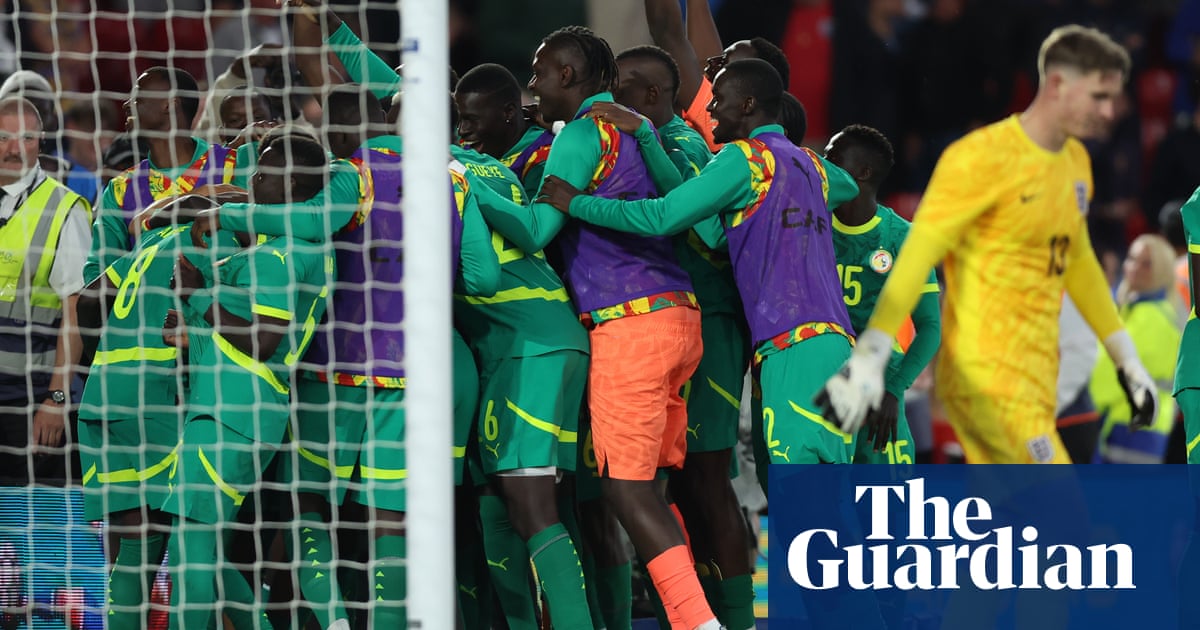Thomas Tuchel wanted smiles. He wanted a response after the lacklustre performance against Andorra in Barcelona on Saturday, albeit in a 1-0 World Cup qualifying win. What he got was another line to his brow, plenty to ponder as he begins what could be a long summer debrief. And more boos.
There had been a bit of zip and character from Tuchel’s team in the final 25 minutes of regulation time. He made attacking changes, with the Nottingham Forest midfielder, Morgan Gibbs-White, showing up. Eberechi Eze, who played from the start, was good. The only problem was that Senegal were 2-1 up by then, having played around and throughEnglandfar too easily.
England looked as though they might escape with a draw in this friendly when Jude Bellingham, who also came off the bench, took a touch on his thigh before lashing home in the 83rd minute after Levi Colwill had smuggled a corner towards him. That would be scrubbed out when the VAR spotted the ball had come off Colwill’s upper arm.
Tuchel went for broke, introducing Ivan Toney for Myles Lewis-Skelly and switching to three at the back. The problem was that the back door was not bolted and how Senegal made England pay, the substitute Cheikh Sabaly sweeping home after a flowing stoppage-time counter to send the home supporters streaming for the exits. The full-time whistle was the prompt for those who stayed to jeer with real feeling. Tuchel’s honeymoon period is firmly over after England’s first defeat by an African nation.
It was easy to feel the shadow ofthe Andorra game, with Tuchel determined to chase it away with an almost entirely different starting XI. Almost. Kane was the lone survivor. Of course he was. It did not matter that the captain is one of the few players Tuchel has worked with extensively at club level and maybe did not absolutely need to see more of here.
Tuchel wanted Senegal to come and play. No 5-4-1 block, bus parked, handbrake on. He expects his England team to raise their level significantly against the better opponents. Pape Thiaw’s Senegal are ranked 19th in the world. It did not matter that Sadio Mané had asked to sit this one out for personal reasons, having been hammered by internet trolls over his recent Senegal performances. Thiaw’s lineup was sprinkled with pace and flamboyance.
Senegal played. There was a moment early on when the quicksilver Iliman Ndiaye streaked away from Lewis-Skelly up the right before tricking inside Conor Gallagher and playing in Nicolas Jackson with a reverse pass. It was a clear chance for Jackson, who blasted too close to Dean Henderson. The tone was set.
Can a visiting team start too well? Lamine Camara was certainly emboldened to try a fancy spin on the edge of his own defensive third and when he was robbed by Eze, who started in the No 10 role, Senegal were stretched. Eze went left to Gallagher, who went further for Anthony Gordon, who shot low. Édouard Mendy made a hash of the save. Kane was alive to the rebound.
It was a strange first-half performance from England, who looked static and predictable when they attempted to play out from the back. Where were the options? Tuchel wants time to instil them. He does not have it. England played with fire as Senegal brought the press. Tuchel’s men played loose passes. They went down, at times, desperately appealing for fouls. It was tough to watch.
Kane made a few nice moves as he dropped back and tried to ignite his team while Gordon blew a golden chance on 29 minutes, dragging wide of an empty net at the far post following a low Kyle Walker cross.
Senegal were the better team before the interval, more cohesive and dynamic, and they deserved the equaliser, swept home by Ismaïla Sarr after he was sharper to react than Walker to Jackson’s hooked cross from the right. Sarr made up three yards on Walker, which really should not have happened, while Jackson had run away from the England debutant, Trevoh Chalobah, on to a ball over the top.
Sign up toFootball Daily
Kick off your evenings with the Guardian's take on the world of football
after newsletter promotion
Senegal had other flickers in the first half. Sarr was left alone to work Henderson with a header and Idrissa Gueye did likewise when he shot through a crowd.
Tuchel made no changes for the second half. He merely sent his players back out early and it was hard to imagine there were not choice words ringing in their ears. Tuchel is not a guy to hold back. Remember hiscomments after Andorra?
He had demanded energy, exuberance. It was Senegal who continued to bring it after the restart. There was a reason why Tuchel introduced the City Ground favourite Gibbs-White just before the hour. The crowd needed a lift. So did England. By then, Senegal might have been ahead, Diarra lifting high following an El Hadji Malick Diouf cross.
It was no surprise when Senegal went ahead, Lewis-Skelly caught out – and not for the first time – by Kalidou Koulibaly’s ball up the inside right channel. Diarra was away, England wide open, the finish steered through Henderson’s legs from a tight angle.
Gibbs-White made a difference while Eze came alive as England tried to respond. There was an outrageous touch and layoff from the latter for Gibbs-White, who drilled too close to Mendy. The pair also combined to tee up Bukayo Saka; his shot was brilliantly saved by the goalkeeper.
Senegal, though, retained a clear threat on the break and, after Bellingham’s effort was disallowed, Sabaly would twist the knife.
